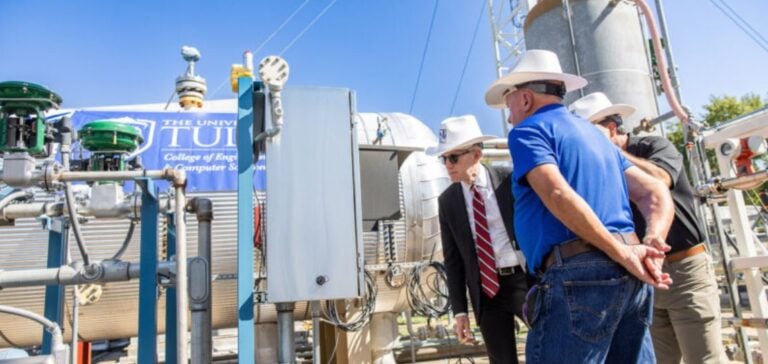The University of Tulsa (UTulsa) and Sagebrush LLC are collaborating on tests to integrate hydrogen into existing natural gas infrastructures.
The aim is to explore the possibilities of reducing carbon emissions by replacing part of the methane with hydrogen, which generates no carbon dioxide when burned.
This approach is part of the search for solutions for cleaner use of existing gas infrastructures.
Research work is being carried out on UTulsa’s North Campus, where researchers are analyzing the effects of mixing different percentages of hydrogen on pipelines, taking into account the risks of leakage and material fatigue.
The main challenge is to strike a balance between hydrogen integration and the viability of existing infrastructures, without compromising safety and efficiency.
Partnership with Sagebrush LLC
For the past two years, Sagebrush, a company specializing in control and measurement systems for pipelines, has been actively involved in this project with UTulsa.
Tom Blair, CEO of Sagebrush, reports that the first test phases have provided valuable data, and that the next series of tests is due to start shortly, with results expected in early 2025.
This partnership makes it possible to leverage university expertise to obtain precise data that can be rapidly applied in an industrial context.
UTulsa’s infrastructure and skills enable research processes to be accelerated to meet the requirements of industry players.
The university offers a unique platform where companies can test and fine-tune their hydrogen integration strategies, while minimizing the operational risks associated with this transition.
Technical challenges and implications for the sector
Integrating hydrogen into natural gas networks poses major technical challenges, particularly in terms of material resistance and flow management.
Tests are currently underway to identify the optimum proportion of hydrogen that can be added to pipelines without causing material damage or increasing the risk of leaks.
This research is crucial for operators wishing to adopt innovative approaches as part of the energy transition.
The results expected from this project could have a significant impact on the way natural gas infrastructures are operated.
The challenge is to identify solutions that enable more flexible and adaptable use of existing infrastructures, with a minimum of additional investment for operators in the sector.
The project led by UTulsa and Sagebrush could thus open up new prospects for the hydrogen market, particularly with regard to the use of existing infrastructures.






















